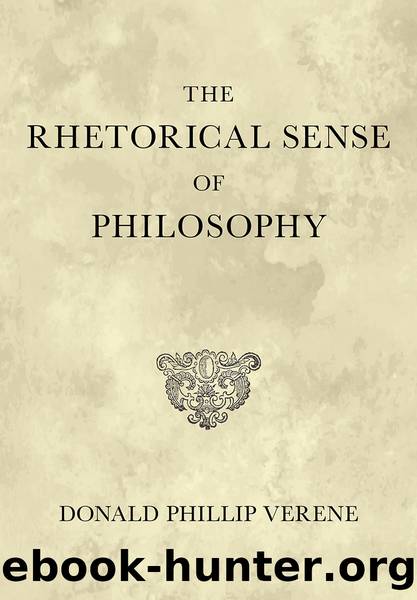The Rhetorical Sense of Philosophy by Donald Phillip Verene;

Author:Donald Phillip Verene;
Language: eng
Format: epub
Publisher: Lightning Source Inc. (Tier 3)
Published: 2021-03-23T00:00:00+00:00
Socratesâ Apologia
There is an old principle in the practice of courtroom law that an attorney should not ask a question of a witness to which the attorney does not know the answer. It is the principle that Socrates employs in questioning those he meets in the agora and elsewhere. Socrates knows one thing in advance: that the person he is questioning does not know the answer because he, Socrates, does not know the answer. When Socrates questions Euthyphro regarding hosion, he knows in advance that Euthyphro does not know what it is, because Socrates also does not know. Socrates does not know the answer because he does not know what it means to be a human being, an anthropos, for to know this would be to possess a knowledge of things both human and divine.
In the Apology Socrates says he may really possess human wisdom, but he does not possess divine wisdom (20dâe). To possess human wisdom implies a knowledge of the difference between human and divine wisdom, but not a knowledge of the divine as such. Without a knowledge of the divine we cannot know fully what it is to be human. Knowledge of what it is to be divine would require an apotheosis such as that of Empedocles, as related by Diogenes Laertius (8.67â68). Diogenes also says: âAristotle in his Sophist calls Empedocles the inventor of rhetoric as Zeno of dialecticâ (8.57).
Socrates knows that he does not possess wisdom because, as Cicero later reports, and as was mentioned in chapter 3, wisdom is understood by the Greeks as âthe knowledge of things divine and human and acquaintance with the cause of each of themâ (Tusc. 4.26.57); he says wisdom has been defined this way âby the philosophers of oldâ (De off. 2.2.5). In the Apology Socrates says that his friend from youth, Chaerephon, went to Delphi and asked the Pythian if anyone was wiser than Socrates. The oracle replied that no one was wiser. The Pythian was correct that no one was wiser than Socrates, but that does not entail that Socrates was in possession of wisdom. No one is in fact in possession of wisdom. The Pythian always speaks in amphiboly (amphibolos). The popular view, that Socrates says that he knows that he knows nothing, is incorrect. Socrates does not claim to possess wisdom. Socratesâ philosophy is not written down because it cannot be put into language. It is never possible adequately to define the meaning of an eidos because the eidÄ are not dialectical in nature. The mind is dialectical, but mind is not an eidos. Dialectic is a means to approach the eidÄ, but the eidÄ in themselves simply are, the Good being the supremely real.
Socratesâ purpose, in his use of the elenchos, his questioning of the orators, poets, and politicians, is to bring them to the realization that they do not possess the Good. In this way he is the gadfly that stings the body politic. Socrates is dangerous because he would turn anyone with whom he speaks into a philosophos, a lover of wisdom.
Download
This site does not store any files on its server. We only index and link to content provided by other sites. Please contact the content providers to delete copyright contents if any and email us, we'll remove relevant links or contents immediately.
The remains of the day by Kazuo Ishiguro(7551)
Tools of Titans by Timothy Ferriss(6946)
The Black Swan by Nassim Nicholas Taleb(6190)
Inner Engineering: A Yogi's Guide to Joy by Sadhguru(5895)
Giovanni's Room by James Baldwin(5878)
The Way of Zen by Alan W. Watts(5799)
The Six Wives Of Henry VIII (WOMEN IN HISTORY) by Fraser Antonia(4790)
The Power of Now: A Guide to Spiritual Enlightenment by Eckhart Tolle(4755)
Astrophysics for People in a Hurry by Neil DeGrasse Tyson(4620)
Asking the Right Questions: A Guide to Critical Thinking by M. Neil Browne & Stuart M. Keeley(4574)
12 Rules for Life by Jordan B. Peterson(3734)
The Ethical Slut by Janet W. Hardy(3502)
Skin in the Game by Nassim Nicholas Taleb(3460)
Housekeeping by Marilynne Robinson(3401)
The Art of Happiness by The Dalai Lama(3382)
Double Down (Diary of a Wimpy Kid Book 11) by Jeff Kinney(3272)
Skin in the Game: Hidden Asymmetries in Daily Life by Nassim Nicholas Taleb(3264)
Walking by Henry David Thoreau(3234)
12 Rules for Life: An Antidote to Chaos by Jordan B. Peterson(3200)
